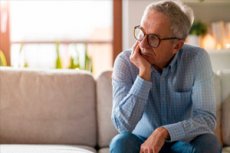Loneliness shortens the number of healthy years in older people
最近審查:14.06.2024

Recent research published in BMC Public Health identifies the impact of loneliness on healthy life expectancy (HLE) and identifies ways to improve subjective well-being and health among older adults.
Loneliness is a feeling of disconnection and dissatisfaction with relationships. Loneliness has been identified as a significant and well-studied predictor of mental and physical illness.
Loneliness can activate autonomic neural responses, causing chronic stress. Loneliness can also worsen age-related diseases and increase the risk of cardiovascular disease (CVD), disability, dementia and frailty. Loneliness can affect men and women differently; Older women who live alone are more likely to suffer from depression and lose physical functionality.
With increasing urbanization in China, traditional family ties and the availability of family support have weakened. Older people in China are at greater risk of loneliness; It is estimated that up to 25% of them experience loneliness.
This study used data from the China Longitudinal Study of Healthy Longevity, which included 15,500 people aged 65 to 99 years. Participants were asked about activities of daily living (ADL) and self-rated health (SRH) as measures of health and well-being.
Rather than assessing the presence of specific diseases, participants' health was assessed using ADL and SRH. Using HLE instead of disease prevalence rates also avoided survival bias.
The aim of this study was to identify the associations between loneliness and life expectancy (LE) in each age group, HLE and healthy life expectancy.
The average age of the participants was 72.9 years. Older women were more likely to be uneducated, have lower incomes, have lost a spouse, and live alone.
Loneliness was also more common among women (29.5%) compared to men (20.2%). However, about 96% of both men and women were physically active, with 82.5% of men and 85.3% of women considering themselves healthy.
One year after the start of the study, elderly people who were lonely were more likely to remain ill than those who did not experience loneliness. Older people living alone were also more likely to die during this period, regardless of their underlying health status.
Lonely people had lower ADL and SRH scores. Life expectancy for single people aged 65 was 20 years, compared to 23 years for those who were not single.
Research has shown that loneliness has a significant impact on healthy life expectancy in older people, especially women. These results highlight the need to develop targeted health promotion programs to mitigate the negative effects of loneliness, especially among older women.
Conclusions
- Loneliness is associated with poor physical and mental health.
- Older women are more susceptible to the effects of loneliness.
- Loneliness can lead to decreased ADL and SRH, which ultimately affects longevity and quality of life.
- Targeted interventions are needed to improve well-being and health among older people, especially women.

